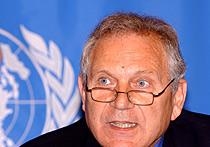Comment: Climate change is making us sick
As governments wrangle over climate change policy and who should pay for it, a global health and humanitarian crisis is building on the ground, says Professor Daniel Tarantola.
As governments wrangle over climate change policy and who should pay for it, a global health and humanitarian crisis is building on the ground, says Professor Daniel Tarantola.

As governments around the world wrangle over climate change policy and who should pay for it, a global health and humanitarian crisis is building on the ground, says Professor Daniel Tarantola.
Professor Tarantola is Chair of UNSW's Initiative for Health and Human Rights, which is organising Asia's first international conference on health, rights and development to be held in Vietnam later this month.
In an article published in The Age and The National Times, he writes that climate change discriminates against those least able to combat it. The World Health Organisation has already attributed 2.4 percent of worldwide diarrhoea and 6 percent of malaria to climate change.
"The first large scale, quantifiable impacts on human health are likely to be changes to the geographic range and seasonality of some infectious diseases, including vector-borne infections such as malaria and dengue fever and food-borne infections, which peak in warmer months. We have also begun to identify as 'climate change' casualties the victims of extreme weather events."
However, he argues future public health consequences loom even larger.
"What of the wider scale disruption to food production with changing rainfall patterns, longer droughts and more intense floods, and the consequent economic losses and food shortages forcing mass migration and exacerbating civil strife? A recent UNICEF report estimates 2.7 billion people live in regions where climate change will interact with underlying economic, social and political problems, with a high risk of violent conflict," Professor Tarantola writes.
Read the full opinion piece at The National Times website
Media contact: Steve Offner | 02 9385 8107 | s.offner@unsw.edu.au